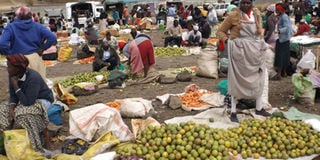Food prices soar by 50 per cent in key granaries

Traders at Olkalou open-air market in Nyandarua County on May 3, 2017. A shortage of fruits has led to a sharp rise in prices. PHOTO | JOHN GITHINJI | NATION MEDIA GROUP
What you need to know:
- At Ms Nyawira’s shop, a 90kg bag of maize is retailing at Sh4,200, up from Sh3,000 between February and March.
- Black beans (njahi) have moved up from Sh8,000 per 90kg bag to Sh10,800, between December and now.
- Ms Nyawira says the prices of pigeon peas and rice have remained almost constant.
- Maize flour has shot up with a 2kg Jogoo maize flour packet rising from Sh90 early this year to Sh110, while a kilogramme of imported sugar is retailing at Sh200, up from Sh175 in December.
Food prices have gone up by nearly 50 per cent in Nyandarua, Nakuru and Laikipia counties in the past three months.
Traders and consumers are also feeling the pressure of diminished supply.
“It is not just about the prices; the issue here is, unavailability is causing the problem,” said Ms Rachael Nyawira, a cereal retailer in Ol Kalou town.
Her sentiments are shared by Mr Joseph Macharia, an employee of Jamaa Supermarkets in the town.
“We are importing most foodstuff. The government should consider waiving import related levies. But for a long-term intervention, the government must invest more in agriculture and support local farmers,” he said.
LOW INCOME EARNERS
Low-income earners are the most affected,” said Mr Macharia. At Ms Nyawira’s shop, a 90kg bag of maize is retailing at Sh4,200, up from Sh3,000 between February and March. A 90-kg bag of beans is retailing at Sh7,700, from Sh5,500 within the same period.
Black beans (njahi) have moved up from Sh8,000 per 90kg bag to Sh10,800, between December and now.
Ms Nyawira says the prices of pigeon peas and rice have remained almost constant.
“But then, we get our rice from Tanzania; the one grown in Kenya is very expensive. It is unaffordable to middle and low-income earners,” she said.
At Jamaa Supermarkets, Mr Macharia said maize flour has shot up steeply, with a 2kg Jogoo maize flour packet rising from Sh90 early this year to Sh110, while a kilogramme of imported sugar is retailing at Sh200, up from Sh175 in December.
BASIC FOOD ITEMS
Local sugar is retailing at Sh185 per kilogramme, from Sh145 per kilogramme in December.
“Wheat flour is not affected much and has actually gone down in some cases, but the prices keep fluctuating. A 2kg Pembe wheat flour packet is retailing at Sh110, against Sh114 in December,” said Mr Macharia.
“Most worrying is the high prices of basic food items, yet retailers must ensure they are always in stock,” said Mr Macharia.
Schools, too, have not been spared, with head teachers in Naivasha saying institutions might be unable to meet budgetary shortfalls occasioned by high food prices.
Naivasha Secondary Schools Principals’ Association welfare chairman Apollo Kamau said the cost of maize and beans was way above the budgetary allocation for most institutions.
BUDGETARY SHORTFALL
He said the prices have increased by almost 50 per cent, making it difficult for schools to meet the budgetary shortfall.
“We are experiencing a near crisis as the prices of basic commodities are over shooting the yearly budgetary estimates,” said Mr Kamau.
He said a bag of maize was going for between Sh4,800 and Sh5,200, while that of beans was being sold at Sh6,500 to Sh7,000.
“We used to purchase a bag of maize for between Sh2,000 and Sh3,000, and that of beans at between Sh4,800 and Sh5,200,” added Mr Kamau.
He said the situation was worsened by the fact that most parents are yet to settle their fees arrears.
“In most schools, the outstanding fees arrears are enormous, further curtailing the institutions’ financial ability to purchase basic food items,” he said.
SCHOOLS WORST HIT
The school principal added that some food items were scarce, occasioning the fluctuation in pricing.
He said they were waiting for communication from the Ministry of Education on how best to address the situation.
“We are also hoping that we shall be able to purchase the food items from government outlets at subsidised fee,” he said, adding that day schools were the worst hit owing to huge population.
In Nyahururu, the prices of common and widely used commodities have continued to attract high prices due to increased demand and shortage of most products.
In Nakuru, cereals and foodstuffs are selling at almost double the earlier prices, with traders saying the situation might worsen.
There is also a scarcity of fruits in the county, with a kilogramme of watermelon, for instance, selling at Sh40, up from Sh35.
Other fruits whose prices have gone up include mangoes and pineapples.
Reported by Waikwa Maina, Steve Njuguna, Macharia Mwangi and Magdalene Wanja




